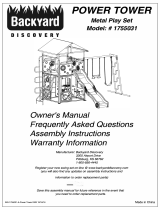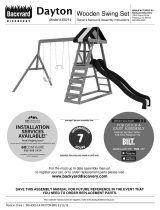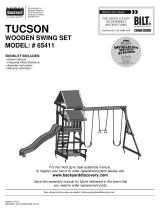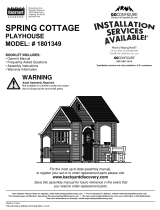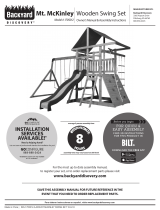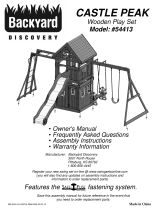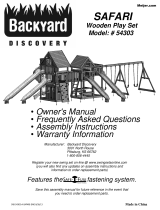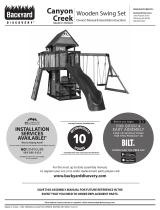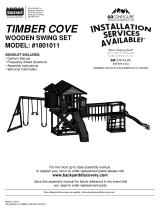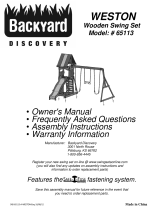Page is loading ...

BREEZY POINT
PLAYHOUSE
Model: # 1801332
Save this assembly manual for future reference in the event that
you need to order replacement parts.
WARNING
Adult Assembly Required.
Not suitable for children under two years,
due to sharp points and small parts
.
BOOKLET INCLUDES:
• Owner's Manual
• Frequently Asked Questions
• Assembly Instructions
• Warranty Information
For the most up to date assembly manual,
to register your set or to order replacement parts please visit
www.backyarddiscovery.com
Made in China
INS-1801332-A-BREEZY POINT-ENG 07/17/18

• 18+ Years of Experience Servicing Big Box Retailers and Direct Consumers
• Highly Skilled, Specialized, Courteous, Professional Service Technicians
• Over 140,000 Installations Annually
• Satisfaction Guarantee
• Flexible Appointments, including weekends
• Coverage across the nation
• White Glove Service Visit www.goconfigure.com for more info!
*Installation services are only available to U.S. customers.
With Go Configure, we bring you 18 years of experience right to your doorstep.
We service a wide array of indoor and outdoor recreation products that most consumers
don’t have the time or ability to deliver & install themselves.
We do the heavy lifting, so you don’t have to!

PLEASE HAVE THE FOLLOWING INFORMATION WHEN YOU MAKE YOUR CALL:
1 – MODEL NUMBER OF THE PRODUCT LOCATED ON THE FRONT OF THE ASSEMBLY MANUAL
2 – DESRIPTION OF THE PART FROM THE PARTS LIST
CUANDO LLAME, TENGA LA SIGUIENTE INFORMACIÓN A LA MANO:
1 - NÚMERO DE MODELO DEL PRODUCTO, QUE SE ENCUENTRA EN EL FRENTE DEL MANUAL DE EN
SAMBLAJE.
2 - DESCRIPCIÓN DE LA PIEZA, SEGÚN SE ENCUENTRA EN LA LISTA DE PIEZAS
PLEASE READ THIS BEFORE STARTING ASSEMBLY
LEA ESTO ANTES DE COMENZAR CON EL ENSAMBLAJE
STOP
ALTO
Missing A Part?
CALL US BEFORE GOING
BACK TO THE STORE!
The store where you made your purchase
does not stock parts for this item.
If you have assembly questions or if you need parts,
whether they are missing or damaged
Call Toll-Free Help Line or visit www.backyarddiscovery.com
¡LLÁMENOS ANTES DE REGRESAR A LA TIENDA!
La enda donde realizó la compra no almacena piezas de este producto.
Si ene preguntas sobre el ensamblaje o si necesita piezas debido a que
faltan o están dañadas
llame gras a la línea de ayuda
1-800-856-4445
• READ THE ASSEMBLY MANUAL COMPLETELY, PAYING SPECIAL ATTENTION TO THE IMPORTANT TIPS AND SAFETY
INFORMATION.
• AFTER YOU HAVE READ THE ASSEMBLY MANUAL, YOU WILL BE ABLE TO DECIDE IF YOU NEED PROFESSIONAL
HELP TO COMPLETE THE ASSEMBLY OF THE STRUCTURE.
• SEPARATE AND IDENTIFY ALL PARTS TO MAKE SURE THAT YOU HAVE ALL OF THE PARTS LISTED.
• IF YOU CAN’T FIND ALL OF THE PARTS, CHECK THE PACKING MATERIAL. SMALL PARTS MAY HAVE FALLEN INTO IT
DURING SHIPMENT.
• IF YOU HAVE PROBLEMS WITH THE ASSEMBLY OR IF ANY PART IS MISSING OR DAMAGED, PLEASE CALL THE
HELP LINE 1-800-856-4445 OR VISIT www.backyarddiscovery.com
•
• LEA ESTE MANUAL DE ENSAMBLAJE COMPLETAMENTE, Y PONGA ATENCIÓN ESPECIAL A LOS CONSEJOS IMPOR-
TANTES Y A LA INFORMACIÓN DE SEGURIDAD.
• DESPUÉS DE HABER LEÍDO EL MANUAL DE ENSAMBLAJE, PODRÁ DECIDIR SI NECESITA AYUDA PROFESIONAL PA-
RA AYUDARLE A TERMINAR DE ENSAMBLAR LA ESTRUCTURA.
• SEPARE E IDENTIFIQUE TODAS LAS PIEZAS PARA ASEGURARSE DE QUE TENGA TODAS LAS PIEZAS ENUMERADAS.
• SI NO PUEDE ENCONTRAR TODAS LAS PIEZAS, REVISE EL MATERIAL DE EMPAQUE. LAS PIEZAS PEQUEÑAS PUE-
DEN HABERSE CAÍDO DURANTE EL ENVÍO.
• MANTÉNGASE ALEJADO DE LOS NIÑOS MENORES A LA EDAD RECOMENDADA.
• SI TIENE PROBLEMAS CON EL ENSAMBLAJE, O SI ALGUNA PIEZA FALTA O ESTÁ DAÑADA , LLAME A LA LÍNEA DE
AYUDA AL 1-800-856-4445 O VISITE www.backyarddiscovery.com

Owner’s Manual Play House
OWNER PH-2011
Dear Customer:
Please read entire booklet completely before beginning the assembly process.
Equipment is recommended for use by children 2 to 10 years of age. Structures are not
intended for public use. The Company does not warranty any of its residential
structures subjected to commercial use such as: Daycare, Preschool, Nursery School,
Recreational Park, or any similar Commercial Application.
WARNING: This Symbol points out important safety instructions which, if not
followed, could endanger the personal safety of yourself and your children
and/or damage your property. You MUST read and follow all instructions in this
manual before attempting to use this play house.
WARNING: Children must NOT use this play house until unit has been
completely assembled and inspected by an adult to insure set has been
properly assembled. Please follow all recommendations below. Failure to
do so may result in the warranty being void and/or safety violations that
could result in serious injury. This manual contains helpful information concerning
Assembly Preparation, Installation Procedure, and Required Maintenance. Always keep the
safety of your children in mind as your play structure is being built and as your children play
with the unit. Before your children play with the unit please review the Operation Instructions
with them to help ensure their safety
.
PLEASE RETAIN THESE INSTRUCTIONS FOR FUTURE REFERENCE. KEEP THEM IN A SAFE
PLACE WHERE YOU CAN REFER TO THEM AS NEEDED. IN ORDER TO PROVIDE YOU WITH THE
MOST EFFICIENT SERVICE, IT IS REQUIRED THAT YOU PROVIDE US WITH THE PART NUMBERS
WHEN ORDERING PARTS.
For Your Records:
Please take time and fill out the information below. This information will be needed for
warranty issues.
Where Purchased: ______________
Date of Purchase: ________________
Installation Date: _______________
Installed by: ______________________
Tracking Number Reference Label
Tracking ID number on the carton and back of the ID plate are included for
tracking purposes associated with warranty claims.
Staple Receipt Here

Owner’s Manual Play House
OWNER PH-2011
Please refer to the Assembly section of the Assembly Manual for Maximum
Fall Height.
Positioning Your Play house
1. The Play house is designed to be installed on a level surface by an Adult with an
Adult helper. Place in a flat area of your yard to minimize ground preparation.
2. Choose a level location for the equipment. This can reduce the likelihood of the play
house tipping over and loose-fill surfacing material washing away during heavy rains.
3. Place the equipment not less than 6 ft (1.8 m) from any structure or obstruction such
as a fence, garage, house, overhanging branches, laundry lines, or electrical wires.
4. It is a good idea to place your Play house in an area that is convenient for adults to
watch children at play.
5. Create a site free of obstacles that could cause injuries – such as low overhanging
tree branches, overhead wires, tree stumps and/or roots, large rocks, bricks and
concrete. We have additional suggestions in the Suggested Playground Surfacing
Section.
6. Do not build your play house on top of surfacing material.
Suggested Playground Surfacing
Playground equipment should never be placed on hard surfaces such as
concrete or asphalt.
Do not install loose fill surfacing over hard surfaces such as concrete or
asphalt.
Shredded bark mulch, wood chips, fine sand and fine gravel, are added as
shock absorbing materials after assembly. If used properly these
materials can absorb some of the impact of a child’s fall.
All surface material should extend a minimum of 6 feet or (1.8 m) in all
directions around the play area.
Do not apply playground surfacing until after the unit is completely
constructed. Play house should not be built on top of surfacing.
Use containment, such as digging out around the perimeter and/or lining
the perimeter with landscape edging.
Installations of rubber tiles or poured-in-place surfaces (other than loose-
fill materials) generally require a professional and are not “do-it-yourself”
projects.
Shall use Playground Surfacing Materials (other than loose-fill material)
which comply with the safety standard ASTM F1292 Standard
Specification of Impact Attenuation of Surfacing Materials within the Use
Zone of Playground Equipment.

Owner’s Manual Play House
OWNER PH-2011
The following chart explains the fall height in feet from which a life
threatening head injury would not be expected
Critical Heights in feet (m) of Tested Materials
Material Uncompressed Depth Compressed Depth
6" (152mm) 9" (228mm) 12" (304mm) to 9" (228mm)
Wood Chips 7' (2.13m) 10' (3.05m) 11' (3.35m) 10' (3.05m)
Double-Shredded bark mulch
6' (1.83m) 10' (3.05m) 11' (3.35m) 7' (2.13m)
Engineered Wood Fibers 6' (1.83m) 7' (2.13m) >12' (3.66m) 6' (1.83m)
Fine Sand 5' (1.52m) 5' (1.52m) 9' (2.74m) 5' (1.52m)
Coarse Sand 5' (1.52m) 5' (1.52m) 6' (1.83m) 4' (1.22m)
Fine Gravel 5' (1.52m) 7' (2.13m) 10' (3.05m) 6' (1.83m)
Medium Gravel 5' (1.52m) 5' (1.52m) 6' (1.83m) 5' (1.52m)
Shredded Tires* 10-12' (3.0-3.6m) N/A N/A N/A
*This data is from tests conducted by independent testing laboratories on a 6-inch depth of uncompressed shredded tire samples
produced by four manufacturers. The tests reported critical heights, which varied from 10 feet to greater than 12 feet. It is recommended that
persons seeking to install shredded tires as a protective surface request test data from the supplier showing the critical height of the material
when it was tested in accordance with ASTM F1292.
Operating Instructions:
NOTE: Your children’s safety is our #1 concern. Observing the
following statements and warnings reduces the likelihood of
serious or fatal injury. Please review these safety rules regularly
with your children.
1. On-site adult supervision is required.
2. Instruct children not to climb when the equipment is wet.
3. Instruct children to never crawl on top of a play house roof.
4. The parents should have the children dress appropriately with well-fitting
shoes. Loose clothing such as scarves and ponchos should not be worn.
Always take off, tie up or tuck in cords and drawstrings on children’s
clothing. These things can get caught on playground equipment and
strangle a child.
5. Instruct children not to attach items to the equipment that are not
specifically designed for use with that equipment (such as ropes,
clothesline, pet leashes, etc.).
6. Instruct children to remove their bike or other sports helmet before playing
on the playground equipment.
7. Instruct children not to use the equipment in a manner other than
intended.
Maintenance Instructions:
At the beginning of each play season:
• Tighten all hardware.
• Lubricate all metallic moving parts per manufacture’s instructions.

Owner’s Manual Play House
OWNER PH-2011
• Check all protective coverings on bolts, pipes, edges and corners. Replace if
they are loose, cracked, or missing.
• Check all moving parts including swing seats, ropes, cables, and chains for wear,
rust, or other deterioration. Replace as needed.
• Check metal parts for rust. If found, sand and repaint using non Lead-based paint
meeting the requirements of Title 16 CRF Part 1303.
• Modifications not approved by the party responsible for compliance could void
user’s authority to operate the equipment.
• Check all wood members for deterioration and splinters. Sand down and splinters
and replace deteriorating members.
• Reinstall any plastic parts, such as swing seats or any other items that were
removed in the cold season.
• Rake and check depth of loose fill protective surfacing materials to prevent
compaction and to maintain appropriate depth. Replace as necessary.
Twice a month during play season:
• Tighten all hardware.
• Lubricate all metallic moving parts per manufacture’s instructions.
• Check all protective coverings on bolts, pipes, edges and corners. Replace if
they are loose, cracked, or missing.
• Check all moving parts including swing seats, ropes, cables, and chains for wear,
rust, or deterioration. Replace as needed.
• Rake and check depth of loose fill protective surfacing materials to prevent
compaction and to maintain appropriate depth. Replace as necessary.
At the end of each play season or when the temperature drops below 32° F:
• Remove plastic swing seats and other items as specified by the manufacturer
and take indoors or do not use.
• Rake and check depth of loose fill protective surfacing materials to prevent
compaction and to maintain appropriate depth. Replace as necessary.
Additional Maintenance:
• Check the swing beam and hardware every two weeks due to wood expansion
and contraction. It is particularly important that this procedure be followed at the
beginning of each season.
• Inspect all wood members monthly. The grain of the wood sometimes will lift in
the dry season causing splinters to appear. Light sand may be necessary to
maintain a safe playing environment. Treat your play house with stain regularly,
to help prevent severe checking/splitting and other weather damage.
• We have applied a waterborne transparent stain to your unit. This is done for
color only. Once or twice a year, depending on your climate conditions, you must
apply some type of protection (sealant) to the wood of your unit. Prior to the
application of sealant, lightly sand any “rough” spots on your play house. Please
note this is a requirement of your warranty.
• Creating and maintaining the Play house on a level location is very important.
Make sure the play house is level and true once each year or at the beginning of
each play season.
• Rake the surface periodically to prevent compaction and maintain appropriate
depths.

Owner’s Manual Play House
OWNER PH-2011
Owners shall be responsible for maintaining the legibility of the warning labels.
Disposal Instructions:
When the Play house use is no longer desired, it should be disassembled and
disposed of in such a way that no unreasonable hazards will exist at the time the unit
is discarded.
This package must be kept because it contains important information!

Owner’s Manual Play House
OWNER PH-2011
APPENDIX A
Information on Playground Surfacing Materials:
The following information is from the United States Consumer Product Safety
Commission’s Information Sheet for playground surfacing material; also
see the following website for additional information:.
www.cpsc.gov/cpscpub/pubs/323.html
X3. CONSUMER INFORMATION SHEET FOR PLAYGROUND SURFACING MATERIALS
11
X3.1 Select Protective Surfacing—One of the most important things you can do to
reduce the likelihood of serious head injuries is to install shock-absorbing protective surfacing
under and around your play equipment. The protective surfacing should be applied to a depth
that is suitable for the equipment height in accordance with ASTM Specification F 1292. There
are different types of surfacing to choose from; whichever product you select, follow these
guidelines:
X3.1.1 Loose-Fill Materials:
X3.1.1.1 Maintain a minimum depth of 9 inches of loose-fill materials such as wood
mulch/chips, engineered wood fiber (EWF), or shredded/recycled rubber mulch for equipment
up to 8 feet high; and 9 inches of sand or pea gravel for equipment up to 5 feet high. NOTE: An
initial fill level of 12 inches will compress to about a 9-inch depth of surfacing overtime. The
surfacing will also compact, displace, and settle, and should be periodically refilled to maintain
at least a 9-inch depth.
X3.1.2 Use a minimum of 6 inches of protective surfacing for play equipment less than 4
feet in height. If maintained properly, this should be adequate. (At depths less than 6 inches, the
protective material is too easily displaced or compacted.) NOTE: Do not install home playground
equipment over concrete, asphalt, or any other hard surface. A fall onto a hard surface can result
in serious injury to the equipment user. Grass and dirt are not considered protective surfacing
because wear and environmental factors can reduce their shock absorbing effectiveness.
Carpeting and thin mats are generally not adequate protective surfacing. Ground level
equipment such as a sandbox, activity wall, playhouse or other equipment that has no elevated
play surface – does not need any protective surfacing.
X3.1.3 Use containment, such as digging out around the perimeter and/or lining the
perimeter with landscape edging. Don’t forget to account for water drainage.
X3.1.3.1 Check and maintain the depth of the loose-fill surfacing material. To maintain
the right amount of loose-fill materials, mark the correct level on play equipment support posts.
That way you can easily see when to replenish and/or redistribute the surfacing.
X3.1.3.2 Do not install loose-fill surfacing over hard surfaces such as concrete or
asphalt.
X3.1.4 Poured-In-Place Surfaces or Pre-Manufactured Rubber Tiles — You may be
interested in using surfacing other than loose-fill materials – like rubber tiles or poured-in-place
surfaces.
X3.1.4.1 Installations of these surfaces generally require a professional and are not “do-
it-yourself” projects.
X3.1.4.2 Review surface specification before purchasing this type of surfacing. Ask the
installer/manufacturer for a report showing that the product has been tested to the following
safety standard: ASTM F 1292 Standard Specification for Impact Attenuation of Surfacing
Materials within the Use Zone of Playground Equipment. This report should show the specific
height for which the surface is intended to protect against serious head injury. This height should
be equal to or greater than the fall height – vertical distance between a designated play surface
(elevated surface for standing, sitting, or climbing) and the protective surfacing below – of your
play equipment.
X3.1.4.3 Check the protective surfacing frequently for wear.
X3.1.5 Placement — Proper placement and maintenance of protective surfacing is
essential. Be sure to:
X3.1.5.1 Extend surfacing at least 6 feet from the equipment in all directions.

Owner’s Manual Play House
OWNER PH-2011
11
This information has been extracted from the CPSC publications “Playground
Surfacing — Technical Information Guide” and “Handbook for Public Playground Safety.”
Copies of these reports can be obtained by sending a postcard to: Office of Public Affairs, U.S.
Consumer Product Safety Commission, Washington, D.C., 20207 or call the toll-free hotline: 1-
800-638-2772.
The American Society for Testing and Materials takes no position respecting the validity
of any parent right asserted in connection with any item mentioned in this standard. Users of
this standard are expressly advised that determination of the validity of any such parent rights,
and the risk of infringement of such rights, are entirely their own responsibility.
The standard is subject to revision at any time by the responsible technical committee
and must be reviewed every five years and if not revised, either approved or withdrawn. Your
comments are invited either for revision of this standard or for additional standards and should
be addressed to ASTM Headquarters. Your comments will receive careful consideration at a
meeting of the responsible technical committee, which you may attend. If you feel that your
comments have not received a fair hearing you should make your views known to the ASTM
Committee on Standards. 100 Barr Harbor Drive, West Conshohocken, PA 19428.

Play House Assembly Manual FAQs:
1. Does the area for the play house need to be level? Yes. Backyard Discovery recommends the play house
be positioned on a flat level area for maximum safety and durability. Any stakes provided should be used to
secure it firmly to the ground.
2. What size area is recommended for the play house? Backyard Discovery recommends at least a 6’ (six foot)
perimeter around and above the play house for maximum safety.
3. What age range is appropriate for the play houses? Backyard Discovery play houses are recommended for
children ages 2 – 10 years.
4. Is the wood treated with chemicals? Backyard Discovery uses 100% Chinese Cedar wood which is naturally
bug resistant, decay and rot resistant. To help ensure your child’s safety, our wood is completely chemical free
and we do not use pressure-treated wood. The stain we use is a top coat using a water-based product that is
for appearance only.
5. How often should the play house be stained? Backyard Discovery recommends the play house be stained
once each year. A water or oil based stain can be used at the customer’s discretion.
6. Why does it seem that my play house is developing cracks? Wood is a natural material; no two pieces are
exactly alike. Each piece has its own characteristics and personality and reacts differently to climate changes.
When any wood product is exposed to the elements, it develops “wood checks”. A check is the radial
separation of the wood fibers running with the grain of the wood. These are caused by the varying temperature
and moisture conditions. A check is not a crack – it does not affect the strength or durability of the wood or
structural integrity of the play house.
7. Do Backyard Discovery play houses come with a warranty? Yes. All Backyard Discovery products carry a 1-
year replacement warranty on all parts for manufacturer’s defect. Our wood carries a 5 year warranty on rot
and decay as well. Please see warranty details for more information.
8. What is the best way to get started assembling the play house? Backyard Discovery recommends taking all
the parts out of the boxes and arranging them by part number before you begin any assembly. This will not
only allow faster assembly, but will also identify any parts that may be missing or damaged so they can be
replaced before assembly. If parts are missing or need replacement, go to
www.backyarddiscovery.com/support.aspx and follow the prompts to order them. Next, read the assembly
manual and get the tools ready for the job as recommended in the manual. If the assembly manual is lost or
misplaced a new one can be printed from Backyard Discovery’s website: www.backyarddiscovery.com.
9. The play house seems to rock or sway too much. What’s wrong? Rocking is caused by uneven ground or
obstructions such as rocks, roots, etc. under the ground rails. These should be removed and the ground
underneath re-leveled to prevent rocking. Also ensure the play house is securely staked to the ground using
any stakes provided.
10. The 2”x4” boards do not measure 2”x 4”. Why not? In the U.S. it’s common practice to describe lumber
dimensions using the rough cut sizes from the sawmill and not the finished dimensions. Retailers, home stores,
etc. all use this accepted practice for describing lumber dimensions. However, Backyard Discovery play
houses are designed and constructed using the actual dimensions so everything fits properly and remains so
during the life of the play house.
For more information and frequently asked questions, please refer to our website at www.backyarddiscovery.com.

Tools Required for Installation:
(These are the tools that are generally required for assembly of our outdoor products. These tools
are not included with the outdoor product purchase.)
(Level 24")
(Square)
(Rubber Mallet - Optional)
(Claw Hammer)
(Tape Measure)
(Cordless Drill or
Electric Drill)
(Drill Attachments:
Phillips Head)
(Phillips Screw Driver)
(3/16, 7/16" Drill Bits)
(Ladder)
(An Adult w/ an
Adult Helper)

SAFETY AND ASSEMBLY INFORMATION
SELECTING THE CORRECT LOCATION FOR YOUR PLAY PRODUCT IS IMPORTANT
FOR YOUR CHILDREN’S SAFETY AND THE PRODUCT’S LONGEVITY
Dimensions:
• The Breezy Point has one layout option.
Layout Ground Dimension
5'-4" x 6-3" x 5'-3" Tall
Safe Play Area*
18'-3" x 17'-4"
*Level Ground Surface - See below
General Information:
Your set has been designed and engineered for
children only and for residential use only.
A maximum of 150 lbs. per child is recommended for
play activities designed for individual use.
A maximum of 120 lbs. per child is recommended for
play activities designed for multiple child use.
A maximum of 6 children is recommended for this unit.
Safe Play Area:
• The safe play area refers to a zone extending 6' beyond the play product on all sides, including the
space above the play product.
• The ground surface must be level. Installing your play product on sloping ground can cause it to
lean or "rack". This leaning puts additional stress on all connections and joints and in time will cause
those connections to loosen and fail.
• The safe play area must be free of all structures, landscaping, trees and branches, rocks, wires,
and other obstacles to safe play. Children can be seriously injured running or swinging into these
obstacles.
• Remove all tripping hazards from the safe play area. Tripping hazards include: roots, stumps, rocks,
landscaping, sprinkler heads, railroad ties, plumbing and electrical connections.
• Play product needs to be installed on solid ground.
SAFE PLAY AREA DIAGRAM
House
«
S
P
A
N
I
S
H
18'-3"
[5.6 m]
17'-4"
[5.3 m]
6'-3"
[1.9 m]
6'
[1.8 m]
5'-4"
[1.6 m]
6'
[1.8 m]
5'-3"
[1.6 m]

Parts Identification
Wood Components
(NOT TO SCALE)
Important Note:
In the event the INK STAMP identifier is not easy to read or is missing from a wood component, match
the unique geometric shape and dimensions of the wood component found in a specific assembly step
to the PARTS IDENTIFICATION section when required. This will aid in identifying the part for assembly
and (or) customer service issues.
AA1 - UPRIGHT - W4L11864
2"x2"x50 3/8" (50x50x1280)
(1)
G10 - ROOF TRUSS - W4L11863
1"x5 1/4"x29 7/8" (24x134x759)
(2)
G11 - ROOF TRUSS - W4L11862
1"x4 3/8"x26 3/4" (24x112x680)
(1)
G12 - ROOF TRUSS - W4L11867
1"x5 1/4"x27 3/8" (24x134x696)
(1)
Q1 - ROOF TRUSS - W4L11880
1"x4 3/8"x22 3/4" (24x112x578)
(1)
G14 - ROOF TRUSS - W4L11883
1"x4 3/8"x22 3/4" (24x112x578)
(1)
G15 - ROOF TRUSS - W4L11865
1"x4 3/8"x26 3/4" (24x112x680)
(1)

Parts Identification
Wood Components
(NOT TO SCALE)
H1 - COUNTER SUPPORT - W4L11999
1"x3 3/8"x5 1/8" (24x86x130)
(1)
H12 - SUPPORT - W4L12026
15/16"x3 3/8"x4 3/4" (24x86x120)
(1)
J1 - RAIL - W4L11704
1"x2 3/8"x23 3/8" (24x60x595)
(2)
J3 - SEAT BRACE - W4L11996
1"x2 3/8"x4 3/4" (24x60x120)
(4)
J4 - COUNTER BRACE - W4L11997
1"x2 3/8"x10 7/8" (24x60x276)
(1)
J5 - COUNTER BRACE - W4L11998
1"x2 3/8"x2 3/8" (24x60x60)
(1)
J6 - SERVING SUPPORT - W4L12005
1"x2 3/8"x2 3/4" (24x60x70)
(2)
J8 - CHAIR UPRIGHT - W4L11684
1"x2 3/8"x12" (24x60x305)
(2)
J9 - CHAIR UPRIGHT - W4L11685
1"x2 3/8"x21 1/2" (24x60x546)
(2)
H2 - FLOWERBOX - W4L12028
1"x3 3/8"x4 1/8" (24x86x103)
(2)
J2 - RAIL - W4L11705
1"x2 1/8"x32 1/4" (24x54x818)
(2)

Parts Identification
Wood Components
(NOT TO SCALE)
J10 - BENCH GROUND BOARD - W4L11688
1"x2 3/8"x22 1/2" (24x60x573)
(2)
J11 - CHAIR RAIL - W4L11686
1"x2 3/8"x11 1/8" (24x60x284)
(2)
K2 - SERVING COUNTER - W4L12006
5/8"x5 1/4"x31 3/4" (16x134x806)
(1)
K91 - ROOF BOARD - W4L12014
3/8"x3 3/8"x62 1/2" (11x86x1586)
(15)
K92 - ROOF BOARD - W4L12015
3/8"x2 5/8"x62 1/2" (11x50x1586)
(1)
K94 - ROOF BOARD - W4L12019
3/8"x3 3/8"x62 1/2" (11x86x1586)
(2)
L1 - COUNTER - W4L12002
5/8"x4 3/8"x19 1/4" (16x112x488)
(1)
K1 - SEAT - W4L11888
5/8"x5 1/4"x22 3/8" (16x134x567)
(1)

Parts Identification
Wood Components
(NOT TO SCALE)
L2 - COUNTER - W4L12003
5/8"x4 3/8"x13 3/4" (16x112x349)
(1)
L3 - FLOWERBOX - W4L12030
5/8"x3 7/8"x18" (16x98x456)
(1)
M1 - FLOOR BOARD - W4L11874
5/8"x3 3/8"x21 5/8" (16x86x548)
(5)
L4 - FLOOR BOARD - W4L11875
5/8"x3 7/8"x21 5/8" (16x100x548)
(1)
M3 - FLOOR BOARD - W4L11876
5/8"x2 5/8"x19" (16x66x482)
(1)
M5 - KITCHEN COUNTER - W4L12000
5/8"x3 3/8"x34 5/8" (16x86x880)
(1)
M6 - KITCHEN COUNTER - W4L12001
5/8"x3 3/8"x34 5/8" (16x86x880)
(1)
M7 - COUNTER SUPPORT - W4L12004
5/8"x3 3/8"x5" (16x86x126)
(1)
M4 - SEAT - W4L11889
5/8"x3 3/8"x22 3/8" (16x86x567)
(1)

Parts Identification
Wood Components
(NOT TO SCALE)
M8 - FLOWERBOX - W4L12027
5/8"x3 3/8"x18" (16x86x456)
(1)
M13 - BENCH SEAT - W4L11689
5/8"x3 3/8"x30 1/8" (16x86x764)
(2)
M14 - BENCH BACK - W4L11690
5/8"x3 3/8"x30 1/8" (16x86x764)
(1)
M15 - BENCH BACK - W4L11691
5/8"x3 3/8"x30 1/8" (16x86x764)
(1)
N1 - RAIL - W4L11696
5/8"x2 1/8"x56 1/8" (16x55x1424)
(1)
N2 - RAIL - W4L11697
5/8"x2 3/8"x46 1/2" (16x60x1180)
(2)
N3 - RAIL - W4L11698
5/8"x2 3/8"x24 7/8" (16x60x632)
(2)
N4 - RAIL - W4L11699
5/8"x2 3/8"x45 1/4" (16x60x1148)
(1)
N5 - RAIL - W4L11700
5/8"x2 3/8"x34" (16x60x865)
(1)
N6 - RAIL - W4L11701
5/8"x2"x21 5/8" (16x50x550)
(4)

Parts Identification
Wood Components
(NOT TO SCALE)
N7 - RAIL - W4L11702
5/8"x2 3/8"x27 3/4" (16x60x705)
(2)
N8 - RAIL - W4L11703
5/8"x2 3/8"x21 7/8" (16x60x556)
(1)
N9 - RAIL - W4L11866
5/8"x2 1/8"x56 1/8" (16x55x1424)
(1)
N12 - RAIL - W4L11881
5/8"x2 1/8"x56 1/8" (16x55x1424)
(1)
N13 - RAIL - W4L11882
5/8"x2 1/8"x56 1/8" (16x55x1424)
(1)
N14 - RAIL - W4L11886
5/8"x2 3/8"x56 1/8" (16x60x1424)
(1)
N15 - RAIL - W4L11887
5/8"x2 3/8"x23 1/4" (16x60x592)
(1)
N16 - CLEAT - W4L11890
5/8"x2 3/8"x5 1/8" (16x60x130)
(1)
N17 - RAIL - W4L12007
5/8"x2 3/8"x34" (16x60x865)
(1)
N18 - RAIL - W4L12009
5/8"x2 3/8"x56 1/8" (16x60x1424)
(1)
N19 - RAIL - W4L12011
5/8"x2 3/8"x21 5/8" (16x60x550)
(1)
O3 - RAIL - W4L11872
5/8"x1 3/8"x22" (16x34x559)
(1)

Parts Identification
Wood Components
(NOT TO SCALE)
O1 - CHAIR RAIL - W4L11687
5/8"x1 3/8"x10 1/4" (16x34x259)
(2)
O2 - RAIL - W4L11873
5/8"x1 3/8"x21 5/8" (16x34x548)
(1)
P1 - UPRIGHT - W4L11692
1 3/8"x1 3/8"x52 3/4" (36x36x1340)
(1)
P2 - UPRIGHT - W4L11693
1 3/8"x1 3/8"x61 3/4" (36x36x1570)
(1)
P4 - UPRIGHT - W4L11695
1 3/8"x1 3/8"x56 3/4" (36x36x1440)
(1)
P5 - UPRIGHT - W4L12010
1 3/8"x1 3/8"x52 3/4" (36x36x1340)
(1)
P6 - UPRIGHT - W4L12012
1 3/8"x1 3/8"x61 3/4" (36x36x1570)
(1)
S1 - WINDOW TRIM - W4L12021
1"x1"x20 3/8" (24x24x518)
(1)
S2 - WINDOW TRIM - W4L12022
1"x1"x22 5/8" (24x24x574)
(3)
S3 - WINDOW TRIM - W4L12023
1"x1"x32 1/4" (24x24x818)
(2)
S4 - WINDOW TRIM - W4L12024
1"x1"x31 1/4" (24x24x794)
(1)
S5 - WINDOW TRIM - W4L12025
1"x1"x20 3/8" (24x24x518)
(2)
P3 - UPRIGHT - W4L11694
1 3/8"x1 3/8"x50 3/8" (36x36x1280)
(1)
P7 - UPRIGHT - W4L12013
1 3/8"x1 3/8"x50 3/8" (36x36x1280)
(1)
/

